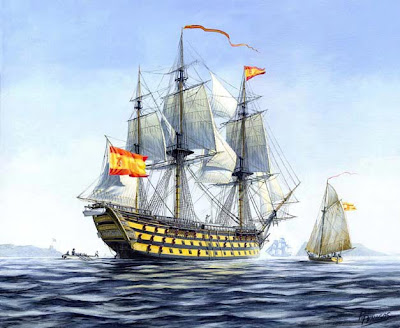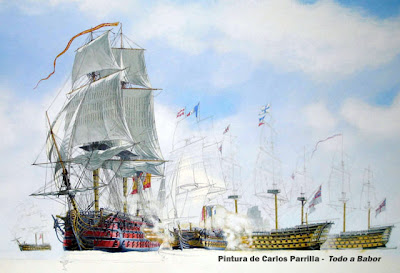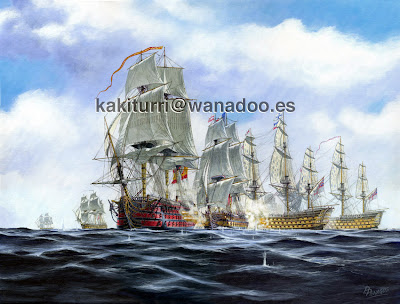Penagos Carlos Parrilla was born in Santander on July 23, 1958, although it is in Madrid where he studies and where he now lives.
Entered the College of Fine Arts of San Fernando degree in Printmaking. During his studies illustrated books and children's literature and youth. He also exhibits his watercolors and prints in several solo and group exhibitions.
Over time devoted to advertising alternating the world of advertising illustration and storyboard for television, with his fondness for Naval History and marine painting, one of the few turtles that exist in Spain.
His work can be seen in www.todoababor.es considered the best website in English Naval History.

With the permission of the artist and the head of "todoababor" I'm going to play in this update to an article in the Web, where Carlos Parrilla, as explained in first person makes a painting, because I find it very interesting to show to the fans to painting and art in general, the mode and manner in which artists approach the work, the techniques used, and comments.

I'll try to explain how the process I followed for the preparation of the work Trafalgar. Top
always imagine the scene by drawing with graphite to a size of one page or less, I do so because it is easier to dominate the outlook.
Once I have the sketch to my taste, scan it and what happened to the computer, I'll leave a couple of days without looking at it because after that time is easier to distinguish errors that may have committed. I'm actually correcting the paint throughout the process, but at least I avoid the mistakes fatter. When I see something I do not like what Photoshop-based amendment. Once
already paid, extends the illustration chosen canvas size, print it and move, first tracing the most general features, and then redrawn all in pencil. Final size more errors often occur, usually proportions.
After having everything ready to pen the review with a Bic pen fine point. I do this because the paint with acrylics, if only left in pencil, it would disappear by applying layers of paint, having to redraw everything over and over again. The pen, however, hold much this process and remains quite visible below the color applied. Anyway I have repeatedly had to go over well.
 We
We color. As I taught for many years, the watercolorist Antonino Martínez Tavera, the color is applied depending on who occupies the ground level, painting first and then as far as close. Although this process step to me on many occasions, in Overall I still logically and, above all, practical. I begin by painting the sky, taking care not to reload or not to elaborate much prominence remove the main reason they are the boats.
The sky is something that seems silly to do, and that could well mean that four strokes is resolved, nothing is further from reality, can not remember a single occasion in which there is no fat sweaty drop by painting .
Once the sky, and they'll tell you this is a hobby I have, I admit, I paint the flags and streamers. I know it sounds stupid, but if you do not paint at the time of the process it does not concentrate on the rest, so I paint the flags and I forget.
This is when I engaged with the boats. Painting a boat is not as difficult as at first glance may seem, at least for me, one thing is that it is laborious, because it is a lot.

In "Trafalgar" First I painted the hull of the "Trinity", skipping the above on the planes away and next (is that I love to paint), then the hulls of other ships, and all without the effects of combat finishes. Once
painted helmets I decided to end the "Holy Trinidad, "partly because I wanted to but mainly because it allowed me the fact that behind him there was only Heaven. That yes, the paint kept the process" far into the foreground plane, ie, I painted the masts from the mizzen to the bowsprit, and the leeward rigging before the windward.
continued with the two boats to the left of the composition, the frigate signals and "Neptune". We must be careful when applying the color, these two factors do not weigh too much and you come forward, for it should be completed and lowering the grayish color with white, so you get to stay in place or at least that is what is intended.
Go to the right of the box. First the masts of the "Temeraire", then the ships of the allied line the bottom, then the "Victory", and finally the "Bucentaure."
Once I have painted all my pleasure boats begin to determine the effects of combat. Not without pain, I mean it, because I cover with cannon smoke and part of the painting before, but not too much. Here falsify reality a little, give me the license, because if you paint the actual outcome of the flashes of black powder vessels would almost hidden by the white smoke, not interested, at least to me no.

We are running out. To me, the sea is the most difficult to paint there. Not a single box with which I have not desperate at this point. As a rule I had to paint the sea as three, four or five times, until I was satisfied. It is a process of painting and plugging in several times, and which often give the right track just by chance, I confess, although I also believe that these incidents appear only after sweating a lot. So much so desperate that I've come to crack the box I was painting in a couple of occasions.
When I see a sea of \u200b\u200bwell managed marine out there, makes me want to kneel before him. Again, paint the sea is very difficult.

And finally, I paint something that always amuses me a lot, so much so that sometimes I find myself completely infantilized making noises with his mouth, like painting in art class in school; astillazos splashes of water. What can I do, in many ways, and fortunately, I'm still like a child.

















